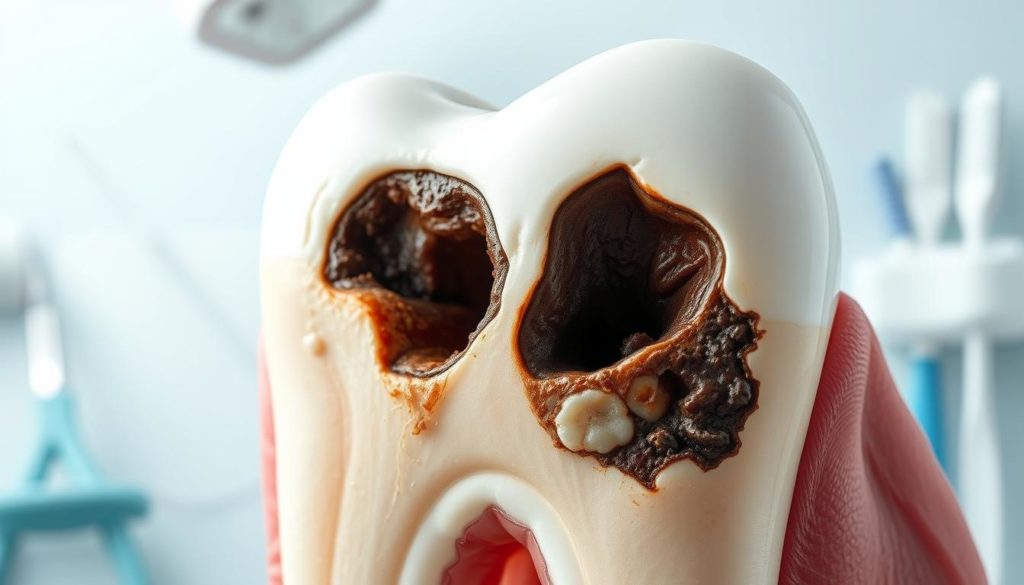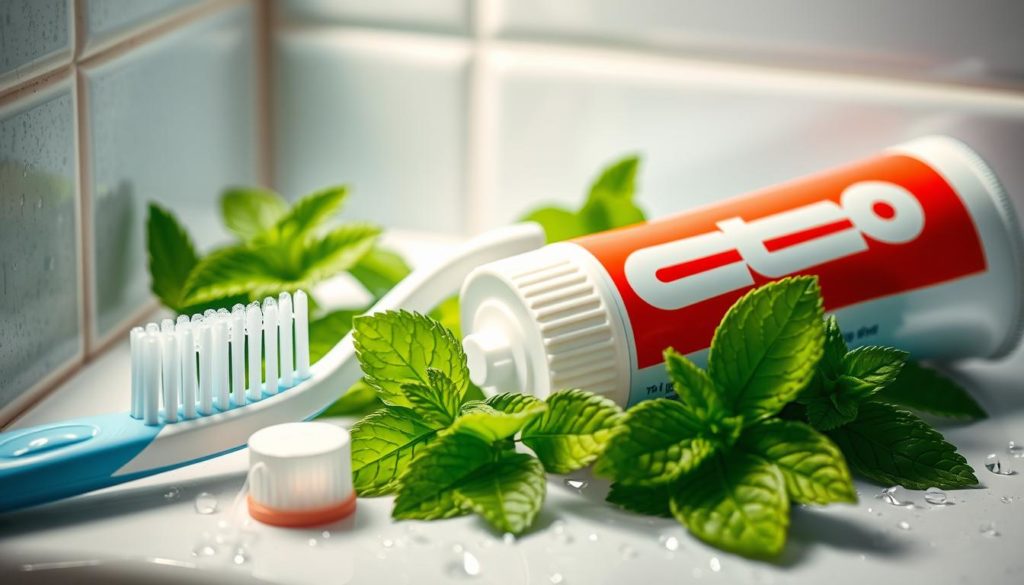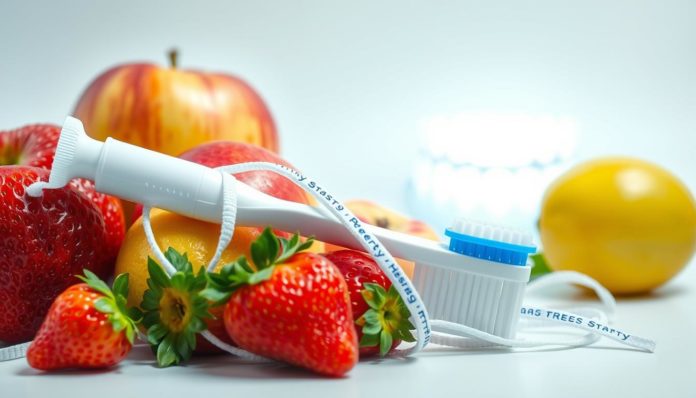Did you know over 90% of adults in the United States have had a cavity? This shows how common dental problems are, even though they can be prevented. Good oral health is key to your overall health. By using effective cavity prevention, you’re investing in a healthier future for your teeth.
Keeping cavities away is easier than you think. It starts with good dental hygiene and understanding the importance of diet and regular check-ups. Simple steps like brushing correctly and picking the right toothpaste can help a lot. This article will show you how to prevent cavities and avoid dental problems.
Understanding Cavities and Their Causes
Cavities, also known as dental caries or tooth decay, are common dental problems. They happen when bacteria in your mouth make acids that damage tooth enamel. This creates small holes. We’ll explain what cavities are and why they occur.
What Are Cavities?
Cavities are damaged areas in your teeth that turn into tiny holes. They develop over time. Dental caries or tooth decay happens when you eat foods with carbohydrates (sugars and starches) and don’t clean your teeth.
Bacteria in your mouth digest these foods, making acids. The acids, bacteria, food debris, and saliva mix to form plaque. Plaque sticks to your teeth and erodes the enamel, causing cavities.

Common Causes of Cavities
- Bacteria and Plaque Build-up: Plaque is a sticky film on your teeth. It turns into hardened tartar if not cleaned, helping bacteria grow.
- Poor Oral Hygiene: Not brushing and flossing well lets plaque and bacteria build up. This leads to cavities and tooth decay.
- Eating and Drinking Habits: Eating sugary or starchy foods and drinks often feeds bacteria, increasing cavity risk.
- Lack of Fluoride: Fluoride makes teeth resistant to acid. Without enough fluoride, your teeth are more at risk.
- Dry Mouth: Saliva cleans your teeth. Less saliva, from some medicines or conditions, raises tooth decay risk.
The Importance of Good Dental Hygiene
Keeping your teeth clean is key to avoiding cavities and keeping your enamel strong. By brushing right and picking the best toothpaste, you can keep your smile bright. This also helps cut down on dental issues.

Brushing Techniques
Good brushing habits are vital in stopping cavities. Here are some important tips:
- Brush Twice Daily: Brush your teeth at least twice a day. Do it after meals to get rid of food and plaque.
- Use Soft-Bristled Brushes: A soft-bristled toothbrush is gentle on your enamel. It cleans well without harming your teeth.
- Brush for Two Minutes: Brush for two full minutes. Make sure to cover all your teeth, including the fronts, backs, and chewing surfaces.
- Angle Your Brush: Hold your toothbrush at a 45-degree angle to your gums. This helps remove plaque and debris from the gumline.
Choosing the Right Toothpaste
Picking the right toothpaste is crucial for good dental care and enamel protection. Consider these factors:
- Fluoride Content: Choose toothpaste with fluoride. It strengthens your enamel and helps prevent cavities.
- Tartar Control: Pick a toothpaste that fights tartar buildup. This can help prevent cavities and gum disease.
- Whitening Ingredients: For a whiter smile, look for toothpaste with gentle whitening agents. Make sure they won’t harm your enamel.
By spending a bit of time on dental care, you can have strong, healthy teeth for life. This reduces the chance of cavities and enamel loss.
Flossing for Cavity Prevention
Flossing is key to keeping your mouth healthy and preventing cavities. This section will explore the different types of floss and show you how to floss right. This way, you can remove plaque and food that cause cavities.
Different Types of Floss
It’s important to pick the right floss for your teeth. Here are the main types:
- Waxed Floss: Easier to slide between tight teeth, but some may find it a little slippery.
- Unwaxed Floss: Thinner and fits into tighter spaces, but it can fray and break more easily.
- Teflon Floss: Smoother than conventional floss, it glides easily even in the smallest gaps.
- Dental Tape: Flatter and broader, making it effective for larger spaces between teeth.
- Floss Picks: Convenient for on-the-go use but may not reach all areas around the gums effectively.
| Type of Floss | Benefits | Drawbacks |
|---|---|---|
| Waxed Floss | Slides easily between teeth | Can be slippery |
| Unwaxed Floss | Thinner, fits tighter spaces | May fray or break |
| Teflon Floss | Glides smoothly | Typically more expensive |
| Dental Tape | Good for larger spaces | Not effective in tight spaces |
| Floss Picks | Convenient | May miss some areas |
How to Floss Correctly
Flossing right is crucial for cavity prevention and good oral health. Here’s how to do it:
- Use about 18 inches of floss, winding most of it around each middle finger, leaving about 2 inches to work with.
- Hold the floss taut with your thumbs and index fingers.
- Slide the floss gently up and down between your teeth, curving it into a C shape against the side of each tooth.
- Gently guide the floss under the gum line, being careful not to snap or force the floss.
- Use clean sections of floss as you move from tooth to tooth.
Adding flossing to your daily routine helps treat cavities and boosts your oral health. It removes hidden plaque and food particles.
The Role of Diet in Dental Health
Keeping your teeth healthy is more than just brushing and flossing. Your diet is key to keeping cavities away. Some foods help protect your teeth, while others can harm them. Let’s explore which foods are good for your teeth and which to avoid.
Foods That Help Prevent Cavities
Choosing the right foods is crucial for cavity protection. Add these to your diet to keep your teeth strong:
- Dairy Products: Milk, cheese, and yogurt are full of calcium and phosphates, great for your teeth.
- Crunchy Fruits and Vegetables: Apples, carrots, and celery clean your teeth as you eat them.
- Leafy Greens: Spinach, kale, and other greens are rich in vitamins and minerals that support healthy gums and teeth.
- Nuts and Seeds: They’re full of nutrients that protect your tooth enamel.
- Green and Herbal Tea: These teas have polyphenols that fight harmful bacteria in your mouth.
Foods to Avoid
Staying away from certain foods can prevent tooth decay. Limit these items:
- Sugary Snacks: Candies, cookies, and cakes are bad because of their high sugar, which causes cavities.
- Sugary Drinks: Soda, sports drinks, and fruit juices can also lead to cavities.
- Acidic Foods and Drinks: Citrus fruits, tomatoes, and drinks like wine can wear away your enamel over time.
- Sticky Foods: Dried fruits and sticky candies stay on your teeth longer, giving bacteria more time to cause decay.
- Refined Carbohydrates: Foods like white bread and chips break down into simple sugars that feed bacteria in your mouth.
By choosing wisely what you eat, you can greatly improve your dental health. Focus on eating nutritious foods and avoid harmful ones. This will help you maintain a healthy, bright smile.
Fluoride and Its Benefits
Fluoride is a mineral that helps prevent cavities and keeps teeth healthy. It strengthens tooth enamel, fighting off tooth decay. Adding fluoride to your daily dental routine boosts your oral health.
There are many ways to get fluoride for strong tooth enamel and to prevent cavities:
- Drinking water: Many places add fluoride to their water, making it easy to get this mineral.
- Toothpaste: Most toothpaste brands have fluoride to use every day.
- Professional treatments: Dentists can apply fluoride treatments during check-ups.
Fluoride repairs weak tooth enamel by adding back lost minerals. It reverses early tooth decay signs. This makes it vital for a healthy, bright smile.
| Source | Benefit |
|---|---|
| Drinking Water | Convenient daily intake of fluoride |
| Toothpaste | Localized application with each brush |
| Professional Treatments | High-concentration fluoride for immediate protection |
In short, getting enough fluoride is crucial for tooth protection and cavity prevention. Stronger tooth enamel means a healthier, more resilient smile.
Regular Dental Check-Ups
Regular dental check-ups are key to keeping your mouth healthy. These visits help prevent cavities and other dental problems.
What to Expect During a Check-Up
At a dental check-up, your dentist will look closely at your teeth and gums. They will:
- Do a professional cleaning to remove plaque and tartar
- Check for cavities and gum disease
- Talk about any treatments you might need, like fillings for cavities
How Often Should You Visit?
To keep cavities and other dental issues at bay, see your dentist every six months. But, how often you go might change. Your dentist might want you to come more often if you have dental problems.
Sealants and Their Role in Preventing Cavities
Dental sealants are a key tool in stopping cavities, especially for kids and teens. These thin coatings are put on the back teeth’s chewing surfaces. They act as a shield against bacteria that cause decay. Let’s look at how they work and who benefits most from them.
How Sealants Work
Sealants block food, plaque, and bacteria, which cause cavities. The dentist first cleans and dries the tooth. Then, they apply an acid solution to make the surface rougher.
Next, they paint on the sealant material. A curing light hardens it, making a strong layer. This layer can last for years, greatly improving oral health.
Who Should Get Sealants?
Sealants are highly recommended for kids and teens. But, adults without cavities or fillings can also get them. The American Dental Association says to apply sealants when permanent molars come in, usually at ages 6 and 12.
In short, dental sealants are a great way to keep teeth healthy and prevent cavities. They are a valuable part of any dental care plan.
Recognizing Early Signs of Cavities
Spotting cavities early can save you from big dental bills and keep your teeth healthy. It’s important to know the signs of tooth decay and get help fast.
Symptoms to Watch Out For
Spotting dental caries early can stop things from getting worse. Here are some common signs to watch for:
- Mild to severe pain in the affected tooth
- Sensitivity when eating or drinking hot, cold, or sweet foods
- Visible holes or pits in the teeth
- Dark spots on the tooth’s surface
- Bad breath or a bad taste in your mouth
Spotting these signs early helps you get the right treatment fast. This stops tooth decay from getting worse.
Early Treatment Options
When caught early, dental caries can be treated with several effective methods. These include:
- Fluoride Treatments: These can help restore the tooth’s enamel by reversing early decay. High-concentration fluoride applications, available professionally, are very effective.
- Fillings: For small cavities, a filling can restore the tooth’s normal shape and function. Different materials, including composite resin, porcelain, or dental amalgam, may be used.
- Sealants: Dental sealants act as a protective barrier, preventing food particles and bacteria from getting stuck in the grooves and depressions of your teeth.
Getting treatment for tooth decay early makes it simpler. This helps keep your teeth healthy for a long time.
Over-the-Counter Dental Products
Over-the-counter dental products are key for better oral health and preventing cavities. They fit well into your daily dental care. Dental experts often suggest them. You can find many products, like mouthwashes, toothpastes, and dental kits, each for a different oral hygiene need.
Mouthwashes, especially those with fluoride, add extra protection against cavities. They kill bacteria and make tooth enamel stronger. Brands like Listerine and Crest offer fluoride-based mouthwashes that are simple to use every day.
Choosing the right toothpaste is important. Look for ones with fluoride to prevent cavities. Dentists recommend Colgate’s Total and Sensodyne’s Repair & Protect for their cavity-fighting and enamel-saving properties. There are also dental kits that include brushes, floss, and paste for a complete oral care routine at home.
It’s crucial to pick over-the-counter dental products that dentists recommend. These products are often supported by scientific studies. Using them daily can greatly improve your dental care routine, keeping your teeth healthy and strong.
FAQ
What are the most effective ways to prevent cavities?
To prevent cavities, brush and floss regularly. Use fluoride toothpaste and eat a healthy diet. Also, visit your dentist for check-ups and cleanings.
How often should I brush and floss my teeth?
Brush your teeth twice a day. Floss once a day to remove plaque and food particles.
What is tooth enamel, and why is it important?
Tooth enamel is the hard outer layer of your teeth. It protects against decay. Keeping it strong with fluoride and good dental care is key to preventing cavities.
Are cavities and tooth decay the same thing?
Yes, cavities and tooth decay are the same. They happen when bacteria break down the tooth enamel.
What foods should I avoid to prevent cavities?
Avoid sugary and acidic foods like candies, sodas, and citrus fruits. They can erode tooth enamel.
How does fluoride help in cavity prevention?
Fluoride strengthens tooth enamel. It makes teeth more resistant to acid attacks from plaque bacteria and sugars.
What can I expect during a dental check-up?
At a dental check-up, your dentist will look at your teeth and gums. They will clean your teeth and may take X-rays to find hidden issues.
How often should I visit the dentist for check-ups?
Visit the dentist every six months. This keeps your teeth and gums healthy and catches problems early.
What are dental sealants, and who should get them?
Dental sealants are a protective coating for the back teeth. They are good for kids and teens but adults at risk can also benefit.
What are the early signs of cavities?
Early signs include tooth sensitivity and pain from sweet, hot, or cold foods. Look for visible holes or pits and tooth discoloration.
Are over-the-counter dental products effective in preventing cavities?
Yes, products like fluoride toothpaste and mouthwashes can prevent cavities. Choose products recommended by dental professionals.


